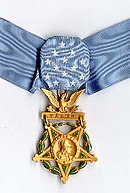This is an old revision of this page, as edited by Kumioko (renamed) (talk | contribs) at 20:57, 5 January 2010 (fix portals, brackets, typos, dates, links, references, categories and formatting replaced: Image: → File: (2) using Project:AWB). The present address (URL) is a permanent link to this revision, which may differ significantly from the current revision.
Revision as of 20:57, 5 January 2010 by Kumioko (renamed) (talk | contribs) (fix portals, brackets, typos, dates, links, references, categories and formatting replaced: Image: → File: (2) using Project:AWB)(diff) ← Previous revision | Latest revision (diff) | Newer revision → (diff)| Drew Dennis Dix | |
|---|---|
 Medal of Honor Medal of Honor | |
| Allegiance | United States of America |
| Service | United States Army |
| Years of service | 1962–c. 1982 |
| Rank | Major |
| Battles / wars | Vietnam War |
| Awards | Medal of Honor Purple Heart Vietnamese Cross of Gallantry |

Drew Dennis Dix (born December 14, 1944) is a decorated United States military veteran and retired major in the United States Army. He was awarded the Medal of Honor for his actions in the Vietnam War; he was the first enlisted Special Forces soldier to receive the medal.
Dix was born in West Point, New York, and raised in Pueblo, Colorado. He enlisted in the Army at age 18 in 1962, hoping to join the Special Forces. Initially turned down because of his young age, he spent three years serving with the 82nd Airborne Division before being accepted into the Special Forces at the age of 21.
By 1968 he had reached the rank of staff sergeant and was assigned as a military adviser to the Army of the Republic of Vietnam (ARVN) in Chau Phu, South Vietnam, near the Cambodian border. On January 31, 1968, Viet Cong forces attacked Chau Phu in the first days of the Tet Offensive. Throughout that day and the next, Dix lead groups of local fighters in rescuing endangered civilians and driving Viet Cong forces out of buildings in the city.
For these actions, Dix was awarded the Medal of Honor by President Lyndon B. Johnson during a ceremony at the White House on January 19, 1969. He later received a direct commission to first lieutenant and retired as a major after 20 years of service. After leaving the Army, he worked as a security consultant, ran an air service in Alaska, and served as Alaska's deputy commissioner for homeland security. In 2000 he wrote a memoir about the fight for Chau Phu entitled The Rescue of River City (ISBN 978-0970309600). Since receiving the medal, he has made numerous public speaking engagements. He currently lives in the mountains of southern New Mexico.
Medal of Honor citation
The President of the United States in the name of the Congress takes pride in presenting the Medal of Honor to
STAFF SERGEANT DREW DENNIS DIX
UNITED STATES ARMY
for service as set forth in the following citation:
For conspicuous gallantry and intrepidity in action at the risk of his life above and beyond the call of duty. S/Sgt. Dix distinguished himself by exceptional heroism while serving as a unit adviser. Two heavily armed Viet Cong battalions attacked the Province capital city of Chau Phu resulting in the complete breakdown and fragmentation of the defenses of the city. S/Sgt. Dix, with a patrol of Vietnamese soldiers, was recalled to assist in the defense of Chau Phu. Learning that a nurse was trapped in a house near the center of the city, S/Sgt. Dix organized a relief force, successfully rescued the nurse, and returned her to the safety of the Tactical Operations Center. Being informed of other trapped civilians within the city, S/Sgt. Dix voluntarily led another force to rescue 8 civilian employees located in a building which was under heavy mortar and small-arms fire. S/Sgt. Dix then returned to the center of the city. Upon approaching a building, he was subjected to intense automatic rifle and machinegun fire from an unknown number of Viet Cong. He personally assaulted the building, killing 6 Viet Cong, and rescuing 2 Filipinos. The following day S/Sgt. Dix, still on his own volition, assembled a 20-man force and though under intense enemy fire cleared the Viet Cong out of the hotel, theater, and other adjacent buildings within the city. During this portion of the attack, Army Republic of Vietnam soldiers inspired by the heroism and success of S/Sgt. Dix, rallied and commenced firing upon the Viet Cong. S/Sgt. Dix captured 20 prisoners, including a high ranking Viet Cong official. He then attacked enemy troops who had entered the residence of the Deputy Province Chief and was successful in rescuing the official's wife and children. S/Sgt. Dix's personal heroic actions resulted in 14 confirmed Viet Cong killed in action and possibly 25 more, the capture of 20 prisoners, 15 weapons, and the rescue of the 14 United States and free world civilians. The heroism of S/Sgt. Dix was in the highest tradition and reflects great credit upon the U.S. Army.
See also
References
 This article incorporates public domain material from websites or documents of the United States Army Center of Military History.
This article incorporates public domain material from websites or documents of the United States Army Center of Military History.
- ^ Johnson, Bill (2008-09-13). "Profiles in honor". Rocky Mountain News. Retrieved 2008-09-17.
- ^ "Medal of Honor Recipients - Vietnam (A–L)". United States Army Center of Military History. 2007-07-16. Retrieved 2008-09-17.
- "Drew Dix". American Valor. Public Broadcasting Service. 2003. Retrieved 2008-09-17.
External links
- Interview at the Pritzker Military Library
- Vietnam War Congressional Medal of Honor Recipient Staff Sgt. Drew Dix